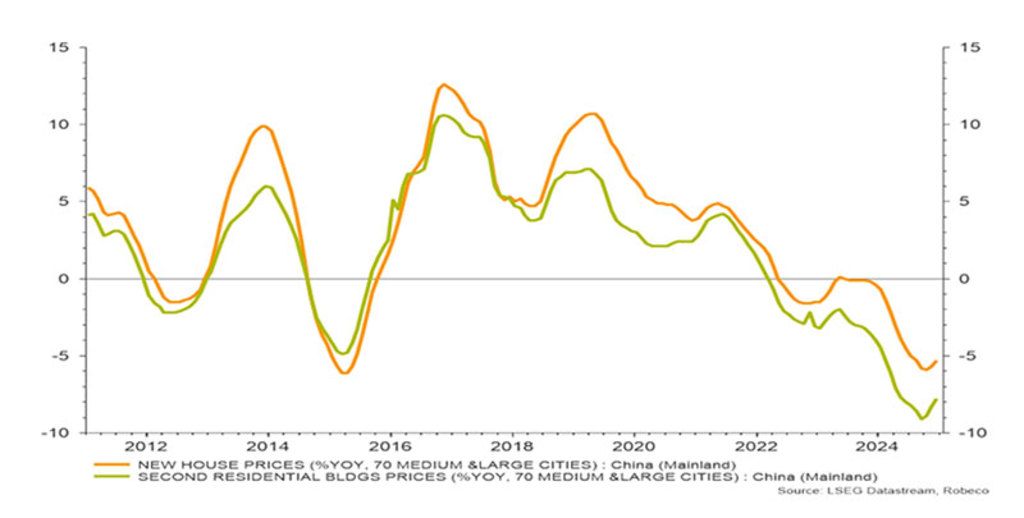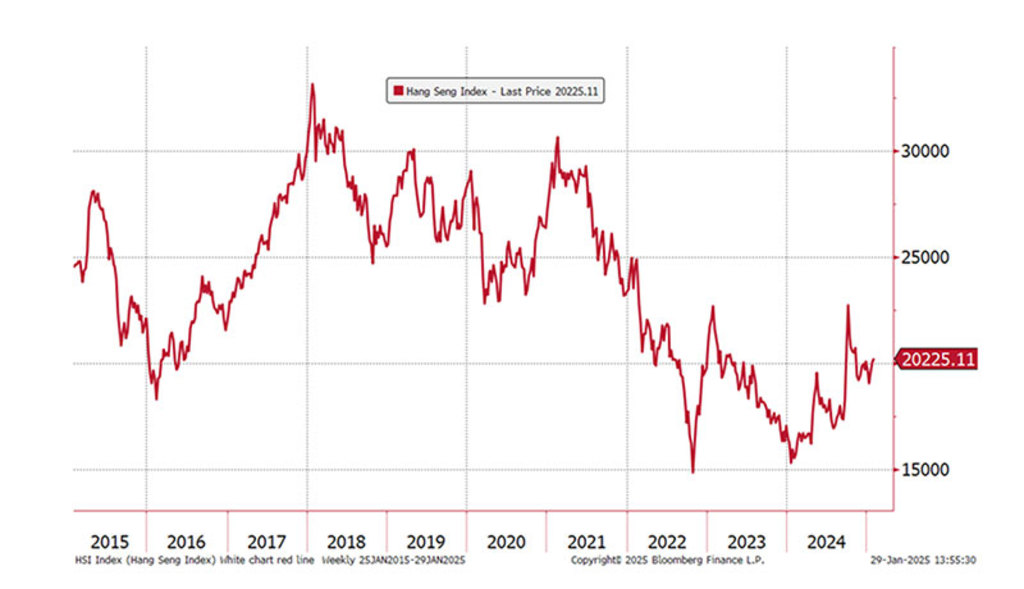

China in the Year of the Snake: Slithering over the bottom
In Chinese folklore, the snake symbolizes intelligence, mystery and renewal. So, will the Lunar Year of the Snake lead to the renewal of faith in Chinese equities and the economy, amid the mystery of how the country has slithered into deflation? Yes, says multi-asset investor Arnout van Rijn, who predicts a near-term bounce for stocks amid a bottoming macro outlook.
まとめ
- Equities should outperform bonds if deflation can be conquered
- China is trying to move from an industrial to a consumer economy
- Trump tariffs are unhelpful but more depends on domestic confidence
Such has been the malaise of the Chinese economy – the second-largest in the world – that its domestic bonds have outperformed equities for the past four years, though the stock market has enjoyed a bounce due to excitement over artificial intelligence in the past six months.
Now it looks like the old snake is shedding its skin, though much depends on the end of deflation – where prices fall, undermining consumer demand that props up the economy – says Van Rijn, Portfolio Manager with Robeco Sustainable Multi-Asset Solutions. Deflation in Japan that began in the 1990s caused its economy to enter a near-permanent recession.
“We addressed the potential Japanification of China in our five-year Expected Returns, where we concluded then that China would not have to face the same ordeal as Japan went through due to much less leverage in property, better monetary policy, and no risk aversion among corporates,” Van Rijn says.
“The logical investment conclusion should then be that equity investors will outperform bond investors in the country. Chinese bond investors have benefited over the past four years, just like in Japan in the 1990s, from the move into deflation, just as Japanese equity investors benefited from the country moving out of deflation. Over the past six months, however, Chinese equity investors have been on the winning side. So, is this the end of Chinese deflation?”
“Chinese steel consumption is seven times that of the EU, while the EU and China are comparable in size by GDP. China is an asset-heavy economy in an adjustment phase: ‘build it and they will come’ has always been the approach. Successful for decades, it has recently run into trouble; the Chinese snake wants to shed its skin and move from investment-driven growth to consumption.
“This has been without success, as consumer confidence is low while income growth is falling back. Savings ratios are staying remarkably high at 44%. The two main reasons for the high savings ratio are a lack of (trust in) social security, which is secular, and weakness in property, which is cyclical, albeit a long drawn-out cycle.”
Tariffs versus growth
Efforts to revive the economy will not be helped by tariffs that US President Trump intends to impose on China to address the massive trade imbalance. The US trade deficit with the rest of the world widened to USD 78.2 billion in November 2024, of which USD 25.4 billion was with China1.
“The Chinese government will have to make some snake-like moves this year to reach its 5% growth target by improving domestic confidence, while at the same time dealing with a hissing US President,” Van Rijn says. “The fall in Chinese house prices has begun to level off, but we’ll have to see whether the Chinese snakes will be house hunting post-Lunar New Year.”

The fall in value in Chinese home prices, year on year. Source: NBS
“China has not seen serious inflation for over a decade as it kept money growth at bay. China saw inflation of just 2% in 2022 when the US and Europe were printing 8%. Deflation has now taken hold, just as debt positions are at a record high. That’s not good.”
“It is our view that this battle has not yet been won, and it will depend on future measures that may entice the consumer to spend. The National Party Congress in March is the next forum that may bring further clarity on this discussion. But don't bet on it... we expect the snake to slither along the bottom.”
Strength of the yuan
One focus for 2025 will be on the relative strength of the yuan. “For any emerging market investor, the quintessential question to ask is: ‘Do you believe the currency will be stable?’” Van Rijn says.
“Today, most people think the yuan is a weak currency, when actually, it is not. The international community focuses on the dollar cross rate far too much. Not much has changed versus the euro over the last decade.”
“Since 2021, the yuan has crept to stronger levels and is now within 5% of the 2015 painful strength level. Some depreciation may actually be in order, especially if the US starts another tariff attack.”
最新のインサイトを受け取る
投資に関する最新情報や専門家の分析を盛り込んだニュースレター(英文)を定期的にお届けします。
It’s now a broader stock market
So, what does this mean for Chinese stocks, which are often seen as a niche and volatile market? The news that Chinese firm DeepSeek had developed an AI model at a fraction of the cost of its US rivals injected a new energy into the mainland A-shares and the affiliated Hong Kong market.
“China is now a very broad and deep stock market,” Van Rijn says. “When DeepSeek became a hot theme, brokers immediately issued a list of a dozen beneficiaries. This is testimony to the longer-term appeal of China. Also, China's market cap-to-GDP ratio at just 56% today (versus 230% for the US), which gives some indication of the value opportunity.”

The Hang Seng Index has had a dismal decade, with a tentative bottom. Source: Bloomberg
US and Europe diverge on monetary policy
“Logically, with deflation not defeated, it is hard to be outrightly bullish. On the one hand, there is a risk of overcapacity and deflation, mostly for the industrials. Here, earnings revisions remain negative. On the other hand, we see strong policy support for equities, and many attractively valued large-cap companies that are not very dependent on the macro economy are showing positive revisions.”
“This explains our preference for offshore equities, where industrials are lightly weighted and the consumer and internet sectors are relatively heavily weighted. We see a Chinese equity bounce along the bottom, with tradable rallies in the Year of the Snake.”
Footnote
重要事項
当資料は情報提供を目的として、Robeco Institutional Asset Management B.V.が作成した英文資料、もしくはその英文資料をロベコ・ジャパン株式会社が翻訳したものです。資料中の個別の金融商品の売買の勧誘や推奨等を目的とするものではありません。記載された情報は十分信頼できるものであると考えておりますが、その正確性、完全性を保証するものではありません。意見や見通しはあくまで作成日における弊社の判断に基づくものであり、今後予告なしに変更されることがあります。運用状況、市場動向、意見等は、過去の一時点あるいは過去の一定期間についてのものであり、過去の実績は将来の運用成果を保証または示唆するものではありません。また、記載された投資方針・戦略等は全ての投資家の皆様に適合するとは限りません。当資料は法律、税務、会計面での助言の提供を意図するものではありません。 ご契約に際しては、必要に応じ専門家にご相談の上、最終的なご判断はお客様ご自身でなさるようお願い致します。 運用を行う資産の評価額は、組入有価証券等の価格、金融市場の相場や金利等の変動、及び組入有価証券の発行体の財務状況による信用力等の影響を受けて変動します。また、外貨建資産に投資する場合は為替変動の影響も受けます。運用によって生じた損益は、全て投資家の皆様に帰属します。したがって投資元本や一定の運用成果が保証されているものではなく、投資元本を上回る損失を被ることがあります。弊社が行う金融商品取引業に係る手数料または報酬は、締結される契約の種類や契約資産額により異なるため、当資料において記載せず別途ご提示させて頂く場合があります。具体的な手数料または報酬の金額・計算方法につきましては弊社担当者へお問合せください。 当資料及び記載されている情報、商品に関する権利は弊社に帰属します。したがって、弊社の書面による同意なくしてその全部もしくは一部を複製またはその他の方法で配布することはご遠慮ください。 商号等: ロベコ・ジャパン株式会社 金融商品取引業者 関東財務局長(金商)第2780号 加入協会: 一般社団法人 日本投資顧問業協会























